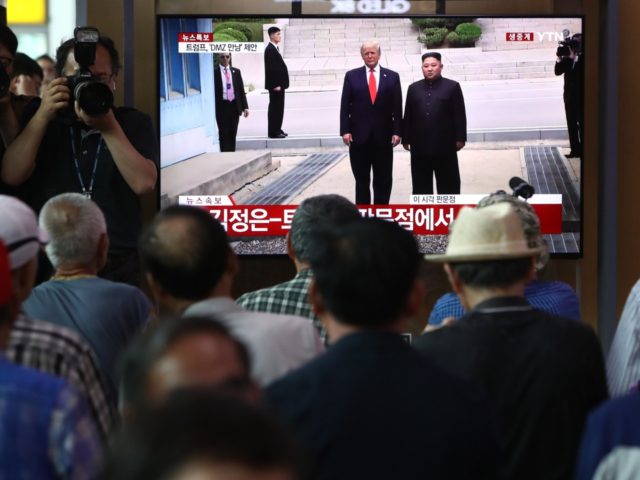North Korea’s state newspaper, the Rodong Sinmun, celebrated President Donald Trump’s visit with dictator Kim Jong-un in the Korean Demilitarized Zone (DMZ) Monday as a “historic meeting” that decisively ended “inglorious relations” between the United States and North Korea, which remain technically at war.
Trump visited South Korea this weekend following his attendance at the G20 summit in Osaka, Japan. After meeting with leftist President Moon Jae-in in Seoul, the two traveled to the DMZ town of Panmunjom, known as the “peace village” for serving as the host location for summits between North and South Korea. In Panmunjom, Trump briefly crossed into the North Korean side, becoming the first U.S. president in history to visit North Korea.
Trump and Kim reportedly discussed rekindling denuclearization talks between the two countries. Talks stopped following a failed meeting between the two this year.
Rodong Sinmun welcomed the occasion, reporting accurately that the meeting was Trump’s idea and calling the meeting a “surprise.”
“In 66 years since the Armistice Agreement in 1953 there happened such an amazing event of the top leaders of the DPRK and the U.S. exchanging historic handshakes at Panmunjom, place that had been known as the symbol of division,” the newspaper reported. “Kim Jong Un said that it was the good personal relations with President Trump that made such a dramatic meeting possible at just a one day’s notice, noting that the relations would continue to produce good results unpredictable by others and work as a mysterious force overcoming manifold difficulties and obstacles in the future, too.”
The two world leaders, according to Rodong Sinmun, “explained issues of easing tensions on the Korean peninsula, ending the inglorious relations between the two countries and making a dramatic turn and also issues of mutual concern and interest which become a stumbling block in solving those issues, and voiced full understanding and sympathy.”
The publication also celebrated that the two agreed to “push forward productive dialogues for making a new breakthrough in the denuclearization of the Korean peninsula.”
Choson Sinbo, another pro-North Korean newspaper that publishes in Japan, also celebrated the meeting, calling it “shock therapy” to revive the increasingly hostile bilateral relationship, according to portions translated by the South Korean newswire service Yonhap.
“In order to end hostile relations, which have continued for a century, this kind of shock therapy overturning common sense and departing from formality and protocol is necessary,” Choson Sinbo argued. Unlike Rodong Sinmun, which gave Trump at least partial credit for the invitation, Choson Sinbo gave the credit to Kim for elevating North Korea on the international stage.
“Today’s turbulent event took place due to the heightened international status of Korea as a new strategic country that has completed developing its nuclear capabilities and the change in the region’s dynamics,” the Choson article reportedly read.
Talks between North Korea and the United States abruptly froze after Trump walked out of an in-person meeting with Kim in February in Hanoi, Vietnam. At the time, Trump told reporters that Kim’s negotiation team wanted sanctions relief in exchange for no material steps towards denuclearization, a claim the North Koreans denied. The communist rogue regime is currently under an unprecedentedly firm international sanctions regime imposed by the United States Security Council and allowed to pass by veto-holding members China and Russia.
A major hurdle in denuclearization talks since their first summit in Singapore last year is that Washington and Pyongyang do not agree on a definition of “denuclearization” – the United States defines it as an end to North Korea’s illegal nuclear program, while North Korea defines it as the removal of U.S. military assets from the Korean peninsula, as America is a nuclear power.
Shortly before the Hanoi summit, State Department Special Envoy for North Korea Stephen Biegun admitted that the two sides “do not have a specific and agreed definition of what final, fully verified denuclearisation” means.
Reports following the dissolution of the summit revealed that North Korea made more demands than simply the lifting of sanctions. According to U.S. media, Kim demanded that Trump recognize North Korea as a legitimate nuclear power and send Pyongyang “famous basketball players” to visit.
There is no indication that Trump and Kim hashed out a mutually agreed-upon definition during their time in Panmunjom. The two sides did not reveal many details from their meeting, only that they agreed to resume talks. That agreement is a significant victory for Trump in part because of the presence of Secretary of State Mike Pompeo at the meeting. Following the Hanoi summit, Pyongyang attacked Pompeo personally, demanding that Trump fire him as a precondition for new talks.
“Hanoi summit gives us a lesson that whenever Pompeo pokes his nose in, the talks go wrong without any results even from the point close to success,” a foreign ministry spokesman said in April. “I am afraid that, if Pompeo engages in the talks again, the table will be lousy once again and the talks will become entangled.”
No reports have indicated that Kim reiterated that demand during the talks this weekend.

COMMENTS
Please let us know if you're having issues with commenting.